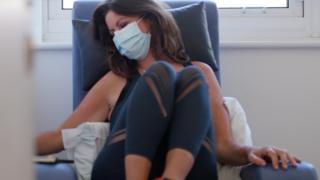
Anyone with symptoms that could be cancer must talk to their GP, even as Covid cases increase across the country, cancer experts say.
Thousands fewer people than normal are being referred for hospital tests – particularly for lung and prostate cancer, Cancer Research UK says.
Although numbers are improving, they are still lower than before lockdown in March.
But GPs say delays in getting tests, scans and X-rays haven’t improved.
“There has been a really devastating impact on cancer services,” said Michelle Mitchell, chief executive of Cancer Research UK.
“But people need to come forward – the difference is now in numbers presenting with symptoms.”
Although NHS staff had worked tirelessly to keep care going during the pandemic, she said it was “essential” that cancer services were kept “up and running” this winter.
Data for England shows that urgent referrals for lung cancer are still only at 60% of their normal level, and urological cancers (prostate, bladder and kidney) are at 78%.
But other cancers, such as breast and bowel cancer, have returned to nearly normal levels.
Since the end of March, however, around 350,000 people who would normally be referred to hospital within two weeks with suspected cancer symptoms were not, according to Cancer Research UK.
The charity estimates that around three million people in the UK have missed out on routine cancer screening since March, after programmes for identifying breast, bowel and cervical cancers were mostly paused.
‘Get message out there’
Dr Neil Smith, GP for Lancashire and South Cumbria Cancer Alliance, said he was worried about not diagnosing patients soon enough with cancer, because they were reluctant to come forward to tell him about cancer symptoms, and anxious about going to hospital for tests.
He said lung cancer screening was “very effective” and the earlier people were diagnosed, the better their chances of survival.
But he said people could be coughing, mistaking that for Covid-19 and then staying at home. He added that fewer men were coming forward with prostate cancer symptoms.
“If you’ve got any symptoms, talk to your GP about it,” said Dr Smith. “It may appear that doors are closed, but there is a telephone-first system.”
A survey of GPs suggests waiting times for blood tests, chest X-rays and scans have still not improved since the end of March.
Dr Jeanette Dickson, president of the Royal College of Radiologists, said radiotherapy treatment for cancer kept going during the pandemic, but people weren’t coming “through the pathway”.
She said patients remained “very anxious” about coming to hospital for treatment.
“We need to get the message out there – we are trying to make the NHS safe.
“We need them to come and be diagnosed – that’s the only way we can help them.”
